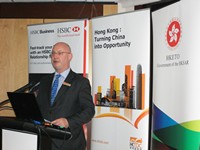 |
| No.6 December, 2011 |
|
| |
|
| |
Hong Kong is the leading centre for offshore Renminbi business |
|
| |
|
|
| |
 Hong Kong is now hosting the largest pool of RMB liquidity outside mainland China according to Steve Barclay, Director of the Hong Kong Economic and Trade Office (HKETO), speaking at the Off-shore Renminbi Seminar at Hong Kong House (7 November). Hong Kong is now hosting the largest pool of RMB liquidity outside mainland China according to Steve Barclay, Director of the Hong Kong Economic and Trade Office (HKETO), speaking at the Off-shore Renminbi Seminar at Hong Kong House (7 November).
As an established international financial centre, Hong Kong was a pioneer in the early days of offshore Renminbi business. Mr Barclay said Hong Kong was the first offshore market to launch RMB business back in 2004, with banks initially offering deposit-taking, currency exchange, remittance, debit/credit card services, primarily to personal customers.
 Over the years, the scope of business has expanded considerably with the introduction of RMB bond issuance in 2007 and RMB trade settlement in 2009. At the end of July 2011 offshore RMB deposits in Hong Kong amounted to around RMB 570 billion. Over the years, the scope of business has expanded considerably with the introduction of RMB bond issuance in 2007 and RMB trade settlement in 2009. At the end of July 2011 offshore RMB deposits in Hong Kong amounted to around RMB 570 billion.
In 2009, China launched a pilot scheme for RMB trade settlement which was expanded in 2010/ 2011. As a result, enterprises in all provinces and cities in China can now settle their trade transactions in RMB with any part of the world.
Mr Barclay said, "The percentage of China's total trade that is settled in RMB has been increasing rapidly, from 0.7% in the 1st half of 2010 to 4% in the 2nd half of 2010, and further to 9% in the 1st half of 2011.
"In the first half of 2011, RMB trade settlement handled by banks in HK amounted to 84% of Mainland China's total RMB trade settlement."
He also noted that Hong Kong is the first place outside Mainland China to have developed an RMB bond market. On 17 August this year, the Ministry of Finance of the Central Government issued sovereign bonds amounting to RMB 20 billion in Hong Kong, RMB 15 billion of which are to be issued for institutional investors and RMB 5 billion for retail investors.
"This is good news for Australian importers and exporters," added Ms Bonnie Shek of the Hong Kong Trade Development Council (HKTDC) who was also one of the keynote speakers. "They now have another option of making and receiving payment in RMB. They may be able to negotiate a better price with their Chinese suppliers and customers by using RMB. Many Chinese companies would prefer that. Other benefits include the elimination of currency exchange costs and risks involving a third currency and shortened settlement cycle which allows business to be done more efficiently."
The seminar hosted by the HKETO and the HKTDC also featured Ken Tay, Head of China Desk at HSBC Bank Australia, and Mr Neil Cambourne, Director Co Head Corporate Sales Global Banking and Markets as keynote speakers.
According to Ken Tay, Head of China Desk at HSBC Bank Australia, "We believe the RMB will be among the top three global trading currencies by 2015, with trade in RMB forecast to be US$2 trillion, equal to about a third of China's global trade. This rapid uptake of RMB is indicative of the financial revolution that is taking place in China. To cater to this growth, HSBC has RMB capabilities in 50 countries across all six continents. HSBC Australia has expanded its RMB trade offering to provide financing in RMB, enabling customers to utilise RMB as they would any other currency. Our internationally-oriented customers across our various businesses including Trade and Supply Chain, Global Markets and Payments and Cash Management have the ability to unlock the potential of RMB."
|
|
| |
|
|
|
| |
 |
|
|
| |
|
|
|
| |
|
|
|
|
 |

